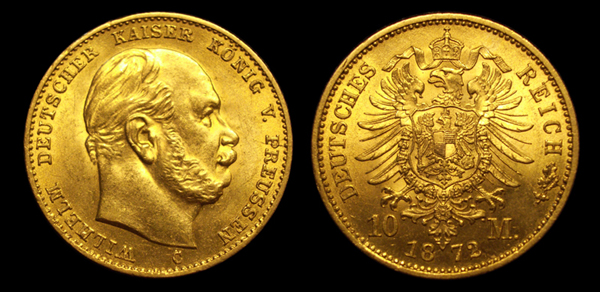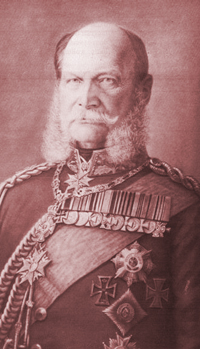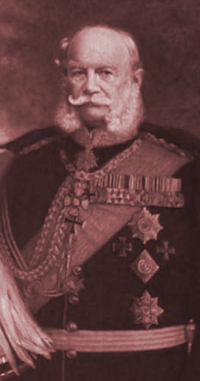
10 MARKS COIN - PRUSSIA - KING WILHELM I GERMAN EMPEROR
(KM 502)
Date: A.D. 1872
Obverse: Portrait head right - WILHELM DEUTSCHER KAISER KONIG V. PREUSSEN (Wilhelm German Emperor and King of Prussia)
Reverse: Crowned imperial eagle and crest - DEUTSCHES REICH 10 M. 1872
|
Wilhelm Friedrich Ludwig of the House of Hohenzollern was King of Prussia and the first German Emperor. The future king and emperor was born in Berlin on March 22, 1797, the second son of King Friedrich Wilhelm III and Queen Louise of Mecklenburg-Strelitz. As the kings second son, young Wilhelm was not expected to ascend to the throne and hence received little education and joined the military at the age of 17 with the intent of becoming a career soldier. He fought against France in the Napoleonic wars where, by all accounts, he proved himself an able and brave soldier as well as an excellent diplomat. In 1829 Wilhelm wed the Princess Augusta of Saxe-Weimar with whom he enjoyed a long happy marriage despite habitual arguments in which he often lost. Of his relationship with his wife and other woman in his life and the general character of the king Otto Von Bismarck later describes Wilhelm In his memoirs as an "old-fashioned, courteous, infallibly polite gentleman and a genuine Prussian officer, whose good common sense was occasionally undermined by female influences". In 1840, his father died and his older brother Friedrich Wilhelm IV ascended to the throne. Unlike his younger brother, Friedrich Wilhelm IV was well educated by private tutors, many of whom were civil servants. His brother faced a changing sociopolitical scene in Europe that he was ill prepared to deal with. This popular movement was facilitated by new political awareness by the working class seeking change, rapid technical advancements, and a popular press that allowed these new ideas concerning social equality and universal suffrage to be spread. Like many monarchs of the time, his brother was largely unsympathetic leading to Prussia's inclusion in the revolutions of 1848, a series of popular revolutions that erupted all over Europe seeking social, economic and political reform. During the Revolutions, Wilhelm successfully crushed a revolt that was aimed at his elder brother with the use of cannons which made him quite unpopular at the time and earned him the nickname 'the Prince of Grapeshot.' When force failed, Friedrich Wilhelm made concessions he had all but refused to make before the violent uprisings. He created a new constitution and a parliament with two chambers, an aristocratic upper house and an elected lower house but since the lower house was elected in a three-tiered system based on the amount of taxes paid, the king avoided true universal suffrage which he vehemently opposed. The new constitution assured the power to appoint all ministers, all bureaucracies and the military would stay firmly under the kings command. In essence, very little changed. In 1857 Friedrich Wilhelm IV suffered a stroke which left him partially paralyzed and mentally incapacitated. In January 1858 Wilhelm became Prince Regent for his brother until his death in 1861 when Wilhelm ascended the throne as Wilhelm I of Prussia. Wilhelm was less political and hands on than his brother, he considered himself more a military man than a politician. Despite his lack of extensive education he was a quick learner as he possessed a solid intellect, common sense, a strong work ethic, and a generally good disposition. He appointed Otto von Bismarck to the office of Prime Minister who shared his conservative monarchal views and with whom he had a cordial relationship with. Under the new constitution Bismarck answered only to the king. Bismarck is credited as being the driving political force behind the throne conducting much of the business of government and political maneuvering as a representative of the kings conservative political policy with the kings approval. Wilhelm was not a casual observer and remained active in the business of government until the day of his death and on more than one occasion the two did not see eye to eye with Bismarck going so far as to threaten resignation over heated disagreements. Bismarck was too valuable to Wilhelm to ever allow him to resign thus causing the king to acquiesce on most accounts. Wilhelm remarked "it is very difficult being Kaiser under a Chancellor like Bismarck." but the king had a begrudging respect for Bismarck who served as his loyal chancellor until the end of his long reign. Otto Von Bismarck's primary objectives were to ensure the supremacy of the Prussian state within Central Europe, and of the aristocracy within the state itself. His most significant achievement was the creation of the modern German state, with Prussia at its core, through a series of wars and political maneuvering in the 1860s. Prussian dominance in Germany was assured by the victory in the Seven Weeks' War against Austria (1866), which led to the creation of the North German Confederation. As King of Prussia, Wilhelm I was entitled to the Presidency of the Confederation. The final act that would bring the reluctant southern German states into the fold would be the Franco-Prussian War (1870-1871). The war saw Prussia break France's power on the European continent leaving Prussia as the dominate state in a new unified German nation. The unification agreements, which created the German Reich, were ratified by the parliaments of the North German Confederation in December 1870 going into effect in January of the next year. According to the agreements, Wilhelm was offered the title of 'German Emperor'. He agreed to accept the title and Wilhelm I was proclaimed German Emperor on January 18, 1871 in Versailles Palace. The title "German Emperor" was a compromise created by Bismarck that Wilhelm accepted begrudgingly. Wilhelm preferred the title "Emperor of Germany" which proved unacceptable to the federated monarchs as it seemed to grant power over lands outside the federation such as Austria, Switzerland, Luxemburg etc. Wilhelm objected to the title "Emperor of the Germans" as he saw his rule as a divine right and himself appointed by God, not by the German people. The Empire took the form of a federal state with the emperor as head of state and president of the federated monarchs which included: Kingdoms: Prussia, Bavaria, Saxony, Wurttemburg Grand Duchies: Baden, Hesse, Mecklenburg-Schwerin, Mecklenburg-Strelitz, Oldenburg, Saxe-Weimar-Eisenach Duchies: Anhalt, Brunswick, Saxe-Altenburg, Saxe-Coburg and Gotha, Saxe-Meiningen Principalities: Lippe, Ruess-Gera, Reuss-Greiz, Schaumburg-Lippe, Schwartzburg-Rudolstadt, Schwarzburg-Sondershausen, Waldeck-Pyrmont, Free Cities: Bremen, Hamburg, Lubeck, and the Imperial Territory of Alsace-Lorraine. In the year 1878 Wilhelm was the target of two assassination attempts . First in August by Max Hödel, a plumber from Leipzig Germany, a former member of the Leipzig Social-Democratic Association who was expelled from the organization becoming an anarchist. Hodel attempted to shoot Wilhelm as he rode in a carriage with his daughter in Berlin. He shot twice missing both times killing a man who attempted to subdue him instead. He was beheaded for his crime three months later. The second attempt occurred in early June when Dr. Karl Eduard Nobiling, a student of philosophy and anarchist with connections to the social democratic party, shot and wounded Wilhelm but failed to kill him. Immediately after the failed attempt Nobiling turned the gun on himself and shot himself in the head dying of his injuries almost four months later. These attempts were a part of a larger rash of assassinations and attempted assassinations of high ranking government figures that were being committed by so called anarchists in Prussia, Spain and Russia and they became the pretext for the institution of the Anti-Socialist Law which was introduced by Bismarck government with the support of a majority in the Reichstag in 1878. The laws deprived the Social Democratic Party of Germany of its legal status and they prohibited all workers movements as well as the socialist and workers’ press, decreed confiscation of socialist literature, and subjected Social-Democrats to reprisals for affiliation with the party. The laws did little to eliminate the Social Democratic Party which quite predictably increased in its influence among the masses during this time. In the end the new German Empire needed more modern institutions of government than Wilhelm could develop or tolerate. He was content to understand "German freedom" simply as national independence and not the universal suffrage that the growing discontented populous called for. The masses would not be denied as his unfortunate successors would discover but Wilhelm spent his last years working tirelessly to preserve the status quo and averting another war. He spent the last hours before his death on March 9, 1888, working and dictating missives on foreign policy dismissing pleas for him to rest saying "I have no time to be tired now." He was 91 years old having ruled as Kaiser of Prussia for 27 years and having Ruled as German Emperor for 17. Wilhelm was succeeded by his son Frederick III who was already ill with terminal cancer and would rule for only 99 days until passing the throne to his 29 year old son Wilhelm II. |


